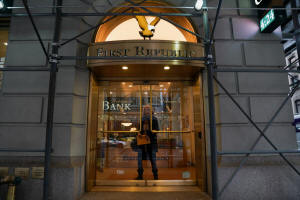ECB watchdog sees no Europe contagion after US, Swiss bank rescues
 Send a link to a friend
Send a link to a friend
 [March 17, 2023] By
Balazs Koranyi, Pete Schroeder and Tom Westbrook [March 17, 2023] By
Balazs Koranyi, Pete Schroeder and Tom Westbrook
(Reuters) - European Central Bank supervisors see no contagion for euro
zone banks from recent turmoil, a source said on Friday, after U.S.
lenders threw First Republic Bank a $30 billion lifeline and tapped
record amounts from the Federal Reserve.
Large U.S. banks on Thursday swooped in to rescue the San
Francisco-based lender, which was caught up in market volatility
triggered by the collapse of two other mid-size U.S. banks.
The rescue package came shortly after embattled Credit Suisse tapped an
emergency central bank loan of up to $54 billion to shore up its
liquidity. Shares in Switzerland's second-largest bank fell again on
Friday despite the move.
The ECB, which on Thursday raised interest rates, held another ad hoc
supervisory board meeting earlier this week in an unusual move ahead of
a scheduled gathering next week.
The ECB supervisors saw no contagion to euro zone banks from the market
turmoil, a source familiar with the content of the meeting told Reuters,
adding that supervisors were told deposits remained stable across euro
zone banks and exposure to Credit Suisse was immaterial.

"While markets are relieved that the Swiss central bank stepped in,
sentiment is bound to remain very fragile, particularly as investors
will likely worry about the eventual economic impact of aggressive
monetary policy tightening by the ECB," said Frédérique Carrier, head of
investment strategy for RBC Wealth Management.
The Frankfurt-listed shares of First Republic rose as much as 5% in
early trading on Friday. The bank's shares had closed up 10% in New York
on Thursday, but fell 17% in after-market trading after it disclosed its
cash position and just how much emergency liquidity it needed. They were
indicated 5% lower in Friday's U.S. pre-market trading.
While the two deals and action by policymakers have helped restore some
calm to global markets, after a torrid week for banking stocks, analysts
and investors are still concerned that the potential for a full-blown
banking crisis is far from over.
The scale of stress was underscored by data on Thursday showing banks in
the U.S. sought record amounts of emergency liquidity from the Fed in
recent days, driving up the size of the central bank's balance sheet
after months of contraction.
The First Republic deal was put together by power brokers including U.S.
Treasury Secretary Janet Yellen, Fed Chairman Jerome Powell and JP
Morgan CEO Jamie Dimon, a source familiar with the situation said.
"They will keep the money in First Republic to keep it alive for self
interest ... to stop the run on banks. Then they will take it away
gradually and the bank will play out a slow death," Mathan Somasundaram,
founder at research firm Deep Data Analytics in Sydney, said on Friday.

[to top of second column] |

A view of the Park Avenue location of
the First Republic Bank, in New York City, U.S., March 10, 2023.
REUTERS/David 'Dee' Delgado

Some of the biggest U.S. banking names including JP Morgan Chase &
Co, Citigroup Inc, Bank of America Corp, Wells Fargo & Co, Goldman
Sachs and Morgan Stanley were involved in the rescue, according to a
statement from the banks.
While the support has prevented an imminent collapse, investors were
startled by First Republic's late disclosures.
"People are concerned that the contagion risk is real, and that
rattles confidence," said Karen Jorritsma, head of Australian
equities, RBC Capital Markets.
"I don't think we are in the crux of a global financial crisis.
Balance sheets are much better than they were in 2008, banks are
better regulated," she added.
Credit Suisse became the first major global bank to take up an
emergency lifeline since the 2008 financial crisis amid doubts over
whether central banks will be able to sustain aggressive rate hikes
to rein in inflation.
LESSONS FROM 2008
For now, authorities are confident the banking system is resilient
and have tried to emphasise that the current turmoil is different to
the global financial crisis 15 years ago as banks are better
capitalised and funds more easily available.
The ECB pressed forward with its 50 basis point rate hike, arguing
that euro zone banks were in good shape and that if anything, higher
rates should bolster their margins.
Focus now swings to the Fed's policy decision next week and whether
it will stick with its aggressive interest rate hikes as it seeks to
get inflation under control.
In Asia, Singapore, Australia and New Zealand said they were
monitoring financial markets but were confident their local banks
were well capitalised and able to withstand major shocks.

While capital remains adequate, analysts say a A$300 billion ($201
billion) refinancing task for Australia's biggest banks is about to
get harder, as appetite for new debt shrinks.
Japan's finance ministry, financial regulator and central bank said
they would meet on Friday to discuss developments.
Banking stocks globally have been battered since Silicon Valley Bank
collapsed last week due to bond-related losses that piled up when
interest rates surged last year, raising questions about what else
might be lurking in the wider banking system.
(Reporting by Pete Schroeder and Chris Prentice in Washington, Nupur
Anand in New York, Tom Westbrook and Rae Wee in Singapore, Scott
Murdoch in Sydney, Noel Randewich in Oakland, California, Balazs
Koranyi, Francesco Canepa and John O'Donnell in Frankfurt, John
Revill in Zurich; Writing by Deepa Babington, Sam Holmes and
Alexander Smith; Editing by Sonali Paul and Kirsten Donovan)
[© 2023 Thomson Reuters. All rights
reserved.]
This material may not be published,
broadcast, rewritten or redistributed.
Thompson Reuters is solely responsible for this content. |